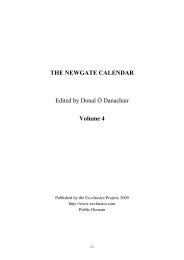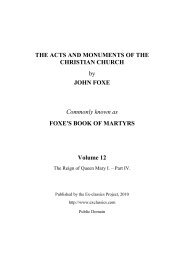PDF format (1.55 Mb) - The Ex-Classics Web Site
PDF format (1.55 Mb) - The Ex-Classics Web Site
PDF format (1.55 Mb) - The Ex-Classics Web Site
You also want an ePaper? Increase the reach of your titles
YUMPU automatically turns print PDFs into web optimized ePapers that Google loves.
THE ANATOMY OF MELANCHOLY<br />
bravest spirits in all our annals, have been base. Cardan, in his subtleties, gives a reason why<br />
they are most part better able than others in body and mind, and so, per consequens, more<br />
fortunate. Castruccius Castrucanus, a poor child, found in the field, exposed to misery, became<br />
prince of Lucca and Senes in Italy, a most complete soldier and worthy captain; Machiavel<br />
compares him to Scipio or Alexander. "And 'tis a wonderful thing" ( saith he) "to him that shall<br />
consider of it, that all those, or the greatest part of them, that have done the bravest exploits here<br />
upon earth, and excelled the rest of the nobles of their time, have been still born in some abject,<br />
obscure place, or of base and obscure abject parents." A most memorable observation, Scaliger<br />
accounts it, et non prætereundum, maximorum virorum plerosque patres ignoratos, matres<br />
impudicas fuisse. "I could recite a great catalogue of them," every kingdom, every province will<br />
yield innumerable examples: and why then should baseness of birth be objected to any man?<br />
Who thinks worse of Tully for being Arpinas, an upstart? Or Agathocles, that Silician king, for<br />
being a potter's son? Iphicrates and Marius were meanly born. What wise man thinks better of<br />
any person for his nobility? as he said in Machiavel, omnes eodem patre nati, Adam's sons,<br />
conceived all and born in sin, &c. "We are by nature all as one, all alike, if you see us naked; let<br />
us wear theirs and they our clothes, and what is the difference?" To speak truth, as Bale did of P.<br />
Schalichius, "I more esteem thy worth, learning, honesty, than thy nobility; honour thee more<br />
that thou art a writer, a doctor of divinity, than Earl of the Huns, Baron of Skradine, or hast title<br />
to such and such provinces," &c. "Thou art more fortunate and great" (so Jovius writes to Cosmo<br />
de Medici, then Duke of Florence) "for thy virtues, than for thy lovely wife, and happy children,<br />
friends, fortunes, or great duchy of Tuscany." So I account thee; and who doth not so indeed?<br />
Abdolominus was a gardener, and yet by Alexander for his virtues made King of Syria. How<br />
much better is it to be born of mean parentage, and to excel in worth, to be morally noble, which<br />
is preferred before that natural nobility, by divines, philosophers, and politicians, to be learned,<br />
honest, discreet, well- qualified, to be fit for any manner of employment, in country and<br />
commonwealth, war and peace, than to be Degeneres Neoptolemi, as many brave nobles are,<br />
only wise because rich, otherwise idiots, illiterate, unfit for any manner of service? Udalricus,<br />
Earl of Cilia, upbraided John Huniades with the baseness of his birth, but he replied, in te<br />
Ciliensis comitatus turpiter extinguitur, in me gloriose Bistricensis exoritur, thine earldom is<br />
consumed with riot, mine begins with honour and renown. Thou hast had so many noble<br />
ancestors; what is that to thee? Vix ea nostra voco, when thou art a dizzard thyself: quod prodest,<br />
Pontice, longo stemmate censeri? &c. I conclude, hast thou a sound body, and a good soul, good<br />
bringing up? Art thou virtuous, honest, learned, well-qualified, religious, are thy conditions<br />
good?--thou art a true nobleman, perfectly noble, although born of <strong>The</strong>rsites -- dum modo tu sis -<br />
- Æacidæ similis, non natus, sed factus, noble χατ εξοχην [chat exochen], "for neither sword, nor<br />
fire, nor water, nor sickness, nor outward violence, nor the devil himself can take thy good parts<br />
from thee." Be not ashamed of thy birth then, thou art a gentleman all the world over, and shalt<br />
be honoured, when as he, strip him of his fine clothes, dispossess him of his wealth, is a funge<br />
(which Polynices in his banishment found true by experience, gentry was not esteemed) like a<br />
piece of coin in another country, that no man will take, and shall be contemned. Once more,<br />
though thou be a barbarian, born at Tontonteac, a villain, a slave, a Saldanian Negro, or a rude<br />
Virginian in Dasamonquepec, he a French monsieur, a Spanish don, a signor of Italy, I care not<br />
how descended, of what family, of what order, baron, count, prince, if thou be well qualified, and<br />
-112
















